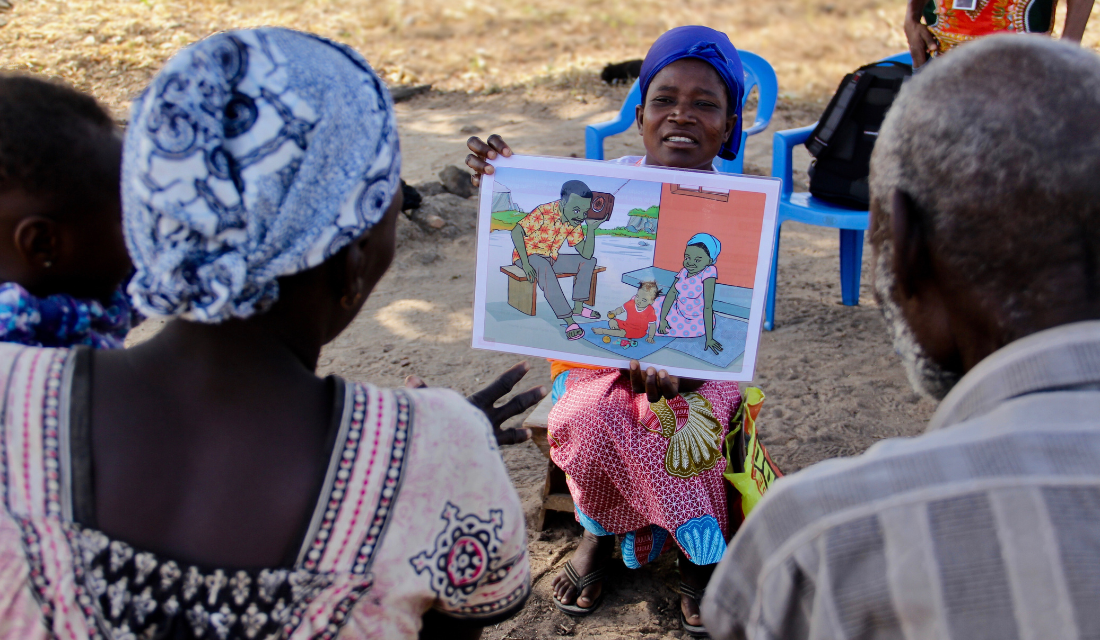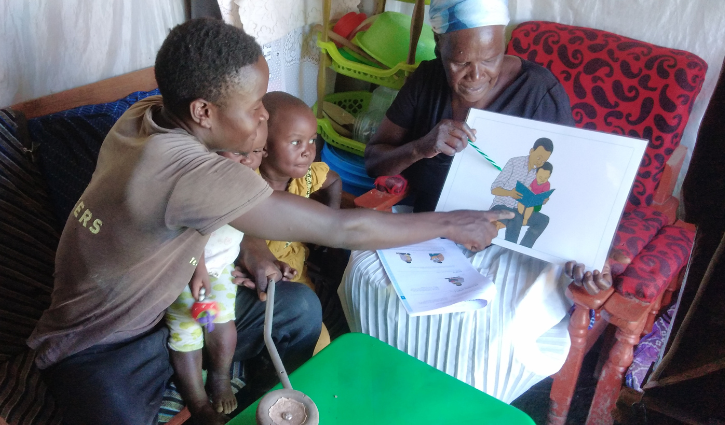Seeing Ourselves in the Story: Making Behavior Change Tools Work for Low-Literacy Communities

“I didn’t even know that children need routine vaccination,” Phelix reflected. “I thought I only had to ensure there was plenty of food in the house.”
Phelix and his wife Abishag are raising two children, Kyan and Leah, in their village in Western Kenya. A hard worker, Phelix farms and makes charcoal to support his family, but because of this he has often deprioritized playing and engaging with his children. Much of the nurturing and household upkeep has fallen to Abishag.
In Kenya, Moments That Matter ® (MTM), the Early Childhood Development (ECD) partnership between Episcopal Relief & Development and ADS-Nyanza, supports parents and caregivers to learn, develop and practice new techniques for helping their children thrive.
“…each day, I work to improve my parenting skills.”
– Phelix
Phelix and his family live in a low-literacy community, which is common in many of the places where Episcopal Relief & Development works. To address this learning challenge, MTM meets people where they are by including image-based participatory tools that support adult participants of all literacy levels to transform their lives and the lives of their families. The tools are developed and modified in partnership with local leaders for use in each community we work with.
Through MTM, Phelix participated in a parenting group led by a community-based ECD volunteer. In communities across Africa, volunteers are trained by our partners to make home visits and host events for parents and caregivers. This model offers families personalized attention as they develop healthy habits.
Guided by the group’s assigned ECD volunteer, Phelix and other parents learned about gentle parenting, healthy family relationships and critical health information for children.
To ensure participants of different literacy levels can benefit from these parenting groups, ECD volunteers use a specially designed workbook, known as an “Actions to Practice Passport.” It includes simple language and common cultural phrases alongside illustrations that portray clothing patterns and skin tones that feel familiar to participants. In addition, the workbook includes activities and checklists to facilitate goal setting, encourage reflection and track progress.
“I started by practicing what I saw in the passport,” Phelix said. “I had to commit to it, and slowly, I enjoyed it. Now, it runs in my blood, and each day, I work to improve my parenting skills.”

In addition to the “Actions to Practice Passport,” ECD volunteers also use FAMA (Facts, Association, Meaning Action) cards to help parents and caregivers visualize and better grasp concepts related to violence prevention, sharing household responsibility, positive discipline for children and other healthy behaviors. Volunteers hold up a card, read a description, and then an individual parent or caregiver, or a group of parents and caregivers, interpret it. There are further questions to help participants see their own actions and empower themselves to change.
Today, Phelix has fully adopted positive parenting skills. He and Abishag share their parenting responsibilities. Phelix even makes toys for Kyan and Leah, and plays with them to strengthen their bond.
The impact of MTM, and the resources used in low-literacy communities, extends beyond individual participants, families and households. When participants graduate from our groups and trainings, they are equipped to share what they’ve learned with their communities. They can correct misinformation, identify abuse and inspire others with their own transformation stories to embrace healthy behaviors.
Phelix, for example, has become a mentor to the other fathers in his community.
“I am proud of the three young fathers I have talked to who have adopted positive parenting practices within five months,” he said. “It’s tough work.”
Episcopal Relief & Development believes that our community-led sustainable programs should meet people where they are. Making our materials accessible and inclusive is a crucial part of working together with communities for lasting change and creating a more just world.
Learn more about how we support communities in building their .


